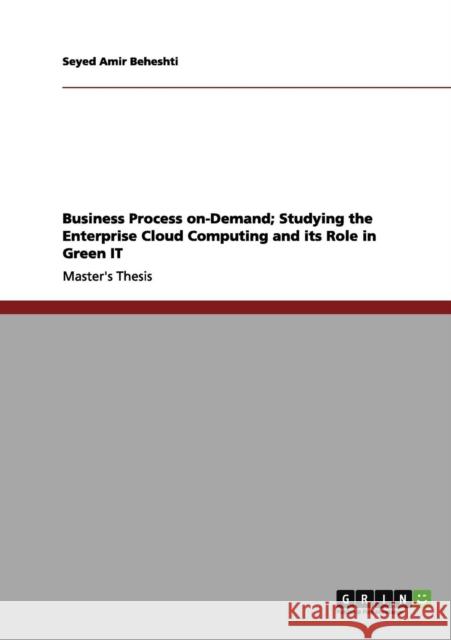Business Process on‐Demand; Studying the Enterprise Cloud Computing and its Role in Green IT » książka
Business Process on‐Demand; Studying the Enterprise Cloud Computing and its Role in Green IT
ISBN-13: 9783640991839 / Angielski / Miękka / 2011 / 176 str.
Master's Thesis from the year 2011 in the subject Engineering - Industrial Engineering and Management, grade: 1, Vienna University of Technology, course: Business Engineering and Computer Science, language: English, abstract: Climate change and the impact it has on our lives have forced many governmental and also non-governmental organizations to conceive of new rules, regulations, and standards to control CO2 and greenhouse gas (GHG) emissions. Calculating the energy efficiency and reducing the electricity consumption in data centers are important steps towards greening the IT in organizations. Several studies have shown that by migrating into the cloud, companies in most cases could reduce their costs in addition to decreasing their greenhouse gas emissions. Unfortunately, lack of guidelines and varying and limited services from different cloud providers, have made the adoption of appropriate Cloud services a challenge for many organizations. In this regard, there is a vital need to study and analyze available services from different cloud vendors and provide enterprises with the best solutions available regarding their specific business requirements. This thesis focuses on cloud computing and its efficiency for individual organizations. It attempts to study the potential benefits of cloud computing by taking the environmental and energy consumption advantages into consideration. Cloud Computing is not a new concept and has been a hype term in recent years. Cloud computing is based on the available technologies and it is all about using a new term for the existing technologies. But the question is why to create a new name for what already exists? The answer to this question is closely related to the potential that Cloud computing has for organizations. It is all about conversion of capital expenditure (CAPEX) to the operational expenditure (OPEX) and the possible advantages that this conversion could have for any organization that choses to migrate into the Cloud.











